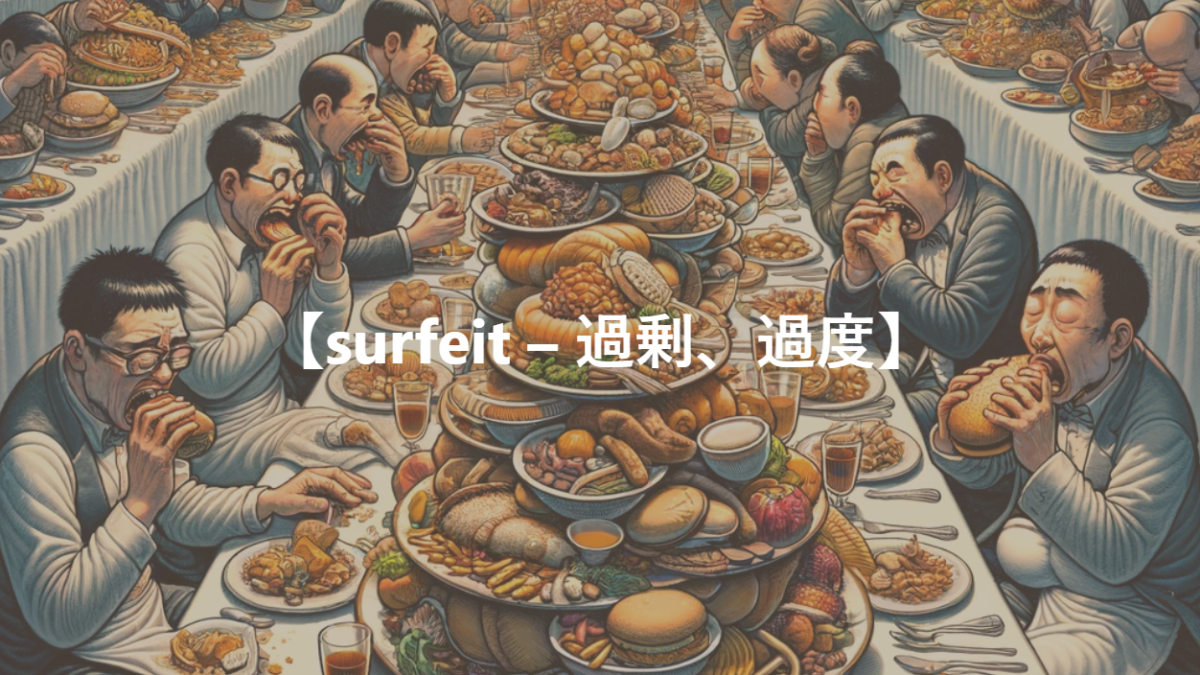語源・類義語・反対語・例文
【surfeit – 過剰、過度】という単語の語源とか由来を知っていますか?
語源:「surfeit」という単語は、中英語の「surfet」から来ています。この中英語の単語は、古フランス語の「surfait」から派生しています。古フランス語の「surfait」は、「過剰」を意味する「surfaire」という動詞から来ており、これは「sur-」(上に、超えて)と「faire」(する、作る)という二つの部分に分かれます。最終的には、ラテン語の「superfacere」(過剰にする)に由来します。「super」は「上に、超えて」を意味し、「facere」は「する、作る」を意味します。
由来:「surfeit」は、食べ物や飲み物を過剰に摂取することを指すために使われることが多かった単語です。これは、中世の祝宴やご馳走の席で、過度に食べたり飲んだりすることが一般的だったことから来ています。この単語は後に、過剰や過度の意味で広く使われるようになり、物や経験の過度な摂取や享受を指すようになりました。
現代の使い方:現代英語では、食べ物や飲み物に限定されず、情報や活動など、あらゆる種類の過剰を指すために「surfeit」が使われます。
Etymology: The word “surfeit” comes from Middle English “surfet.” This Middle English word is derived from Old French “surfait.” The Old French “surfait” comes from the verb “surfaire,” which means “to overdo.” This verb is composed of two parts: “sur-” (over, beyond) and “faire” (to do, to make). Ultimately, it originates from the Latin “superfacere” (to overdo). In Latin, “super” means “over, beyond,” and “facere” means “to do, to make.”
Origin: “Surfeit” was often used to refer to the excessive consumption of food and drink. This usage comes from medieval feasts and banquets where overindulgence in eating and drinking was common. The word later broadened to generally refer to any kind of excess or overindulgence, whether in terms of material goods or experiences.
Modern Usage: In modern English, “surfeit” is used to refer to excesses of all kinds, not limited to food and drink. It can describe an overabundance of information, activities, and more.
この単語の類義語・反対語を教えてください。
類義語
- Excess – 余剰、過剰。
- Overabundance – 過剰な供給や量。
- Glut – 溢れるほどの量。
- Overindulgence – 過度な享楽。
- Overflow – あふれること。
- Plethora – 過多。
反対語
- Deficiency – 不足、欠乏。
- Lack – 不足、欠如。
- Scarcity – 希少性、不足。
- Shortage – 不足、欠乏。
- Insufficiency – 不充分。
- Deprivation – 剥奪、欠乏。
この単語に似た単語で間違いやすい単語はありますか?
- Surplus: 「余剰」や「余分」という意味で、供給が需要を超える状態を指します。これは「surfeit」に類似していますが、主に経済的な文脈で使われることが多いです。
- Suffice: 「十分である」という意味で、必要な量や条件を満たしている状態を指します。この単語は「surfeit」の反対の意味を持ちますが、発音が似ているため混同される可能性があります。
- Saturate: 「飽和させる」や「満たす」を意味し、ある物質が他の物質に完全に浸透または吸収された状態を示します。これも「surfeit」と意味が近いですが、特に化学や物理の文脈で使われます。
- Suffuse: 「満たす」や「充満させる」という意味で、通常は色や光が何かに広がる様子を指します。この単語は感覚的な充満を表しますが、「surfeit」と混同されることがあります。
この単語を使った例文を5つほど教えてください。
After the feast, I felt a surfeit of food and could barely move.
(宴会の後、私は食べ物の過剰でほとんど動けませんでした。)
The market was flooded with a surfeit of cheap products.
(市場は安価な商品の過剰にあふれていました。)
She had a surfeit of material possessions but felt empty inside.
(彼女は物質的な所有物には過剰なものを持っていましたが、内面は空虚でした。)
The surfeit of information available on the internet can be overwhelming.
(インターネット上の情報の過剰は圧倒的になることがあります。)
His surfeit of ambition led him to neglect his personal relationships.
(彼の過度の野心は、個人的な関係を軽視する結果となりました。)
【surfeit – 過剰、過度】のコロケーション
- Surfeit of information: 情報過剰。インターネットやメディアによって大量の情報が提供され、それが過剰になり、処理できない状況を表します。
- Surfeit of wealth: 富の過剰。個人や社会が極端に多くの富を持っている状況を指し、しばしば財政的な不平等や倫理的な問題を暗示します。
- Surfeit of food: 食べ物の過剰。消費できるよりも多くの食べ物がある状態を指し、飽食や無駄遣いを示します。
- Surfeit of choices: 選択肢の過剰。選択可能なオプションが多すぎて決定を困難にさせる状況を表します。これは選択のパラドックスと関連していることがあります。
- Surfeit of luxury: 贅沢の過剰。過度に贅沢な生活様式や物資がある状況を示し、しばしば道徳的または社会的な批判の対象となります。
「surfeit」という単語は、何かが過剰、つまり必要以上に多い状況を表すのに使われます。この用語は、多くの異なるコンテキストで使用され、しばしば負の意味合いを持っています。ここでは、この単語がどのように使われるかについて、いくつかの一般的なコロケーションを通じて詳しく見ていきます。
まず、「Surfeit of information」は情報過剰を意味します。この表現は、現代の社会において特に関連があり、人々が日々直面する大量のデータやニュースに圧倒される状況を指します。この情報の洪水は、重要な情報を見分けることを困難にし、しばしばストレスや不安を引き起こします。
次に、「Surfeit of wealth」は、富の過剰を表します。この状況は、一部の個人や集団が極端な富を持ち、それが社会的不平等や倫理的な問題を生じさせることを示しています。これは、富の公正な分配や道徳的な責任に関する議論を引き起こすことがあります。
「Surfeit of food」は、食べ物の過剰を指します。この表現は、食べ物が豊富にありすぎて無駄になる状況や、過食を引き起こす環境を示します。これは、食品廃棄や肥満などの問題につながる可能性があります。
「Surfeit of choices」は、選択肢の過剰を意味します。これは、選ぶことができるオプションが多すぎて、決定を下すことが難しくなる状況を指します。この状態は、選択のパラドックスとして知られており、多くの選択肢が実際には満足度を下げる原因となることがあります。
最後に、「Surfeit of luxury」は、過度の贅沢を指します。これは、物質的な富が過剰に追求され、それが道徳的または社会的な批判の対象となる状況を表します。これは、贅沢と消費主義の文化に対する反省を促します。
これらのコロケーションを通じて、「surfeit」という単語が表すのは、何かが適度な量を超えているという概念です。この単語は、過剰がもたらす可能性のある負の結果を強調するために使用され、バランスと節度の価値を思い出させます。
The term “surfeit” is used to describe situations where something is excessive, that is, more than what is necessary. This term can be applied in various contexts and often carries a negative connotation. Here, we will delve into how this word is used through several common collocations.
First, “Surfeit of information” refers to an excess of information. This phrase is particularly relevant in today’s society, where people are overwhelmed by a vast amount of data and news they face daily. This flood of information makes it difficult to discern important details, often leading to stress and anxiety.
Next, “Surfeit of wealth” denotes an excess of riches. This condition suggests that some individuals or groups possess extreme wealth, leading to societal inequalities and ethical issues. This can spark debates regarding the fair distribution of wealth and moral responsibilities.
“Surfeit of food” points to an excess of food. This expression illustrates situations where there is so much food that it leads to waste or overeating. This can contribute to problems such as food wastage and obesity.
“Surfeit of choices” means an excess of options. This refers to situations where there are too many choices available, making it difficult to make decisions. Known as the paradox of choice, this condition can actually decrease satisfaction as having too many options can be overwhelming.
Lastly, “Surfeit of luxury” indicates excessive luxury. This situation highlights environments where material wealth is pursued excessively, leading to moral or social criticism. It prompts reflections on the culture of luxury and consumerism.
Through these collocations, what the word “surfeit” represents is the concept of exceeding a moderate amount. It is used to highlight the potential negative outcomes of excess and reminds us of the value of balance and moderation.
文法問題: “surfeit” (過剰、過度)
- 品詞と使い方:
The holiday season often leads to a _________ of food and drink.
(A) surfeiting
(B) surfeited
(C) surfeit
(D) surfeits
解答と解説: (C) surfeit 空欄には、a の後に名詞が必要です。surfeit は「過剰」「過度」という意味の名詞です。
– - 動詞形:
The guests were _________ with rich food and wine at the banquet.
(A) surfeit
(B) surfeited
(C) surfeiting
(D) surfeits
解答と解説: (B) surfeited 空欄には be 動詞の後に続く過去分詞が必要です。surfeit は「~を過剰に与える」という意味の動詞で、ここでは受動態の形になっています。
– - 前置詞との組み合わせ:
The company experienced a _________ of orders during the holiday season.
(A) surfeit in
(B) surfeit of
(C) surfeit on
(D) surfeit for
解答と解説: (B) surfeit of 「~の過剰」という意味で、surfeit は前置詞 of と一緒に使われます。
– - 類義語:
The excessive amount of information available online can lead to a _________ of data.
(A) surfeit
(B) glut
(C) overabundance
(D) all of the above
解答と解説: (D) all of the above surfeit, glut, overabundance はいずれも「過剰」という意味で、この文脈ではすべて適切です。
– - 誤文訂正:
The surfeits of cheap goods from overseas has hurt domestic industries.
解答と解説: surfeits → surfeit 「surfeit of cheap goods」で「安価な商品の過剰供給」という意味のまとまりになります。ここでは、この過剰供給全体を一つの出来事として扱っているため、単数形の surfeit が適切です。

